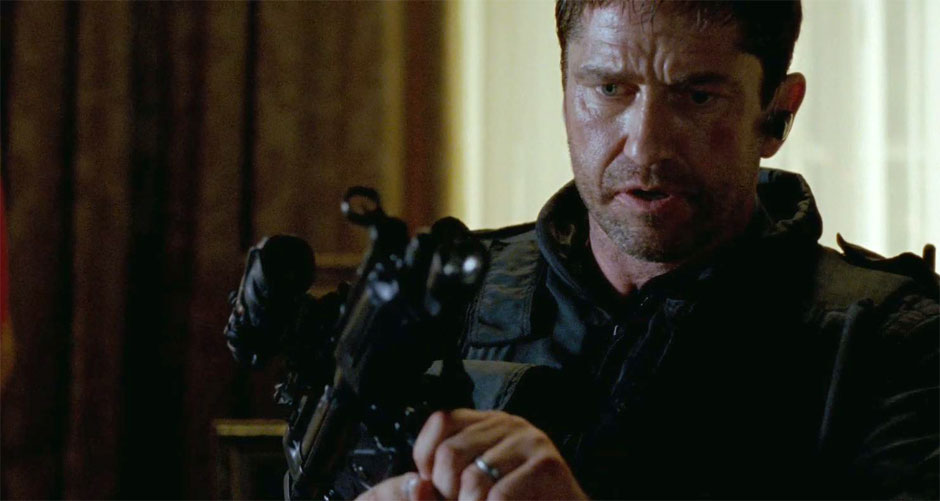Olympus has Fallen

Modern cinema revels so frequently in destruction and chaos that it is
extraordinary that a film as unambitious and appalling as Olympus Has
Fallen can surprise you in the way that it fetishises big guns,
explosions, high body counts and the demolition of various American
monuments. Mindless blockbusters like this sell to teenage boys on the
promise of more explosions and less brains. This is more disturbing
considering how long the film lingers over people blown to bits and
buildings destroyed. Derivative and poorly scripted, Olympus Has
Fallen will put you to sleep with its sluggish pacing and
relentlessly dull action scenes, or make your skin crawl with its
chest-beating and laughable celebration of all things born in good old
USA.
The director was Antoine Fuqua (Training Day, Shooter), who has a
long history as a music video artist. He directed the music video
for the song Gangsta's Paradise by rapper Coolio and worked with
Prince and Stevie Wonder too. Here he has paired with novice
screenwriters Creighton Rothenberger and Katrin Benedikit to make a
rip-off of the popular Clint Eastwood vehicle In the Line of Fire.
Eastwood played an ageing secret service agent, whose inner demon was
that he failed to save John F. Kennedy, and a lunatic stalking him was
going to murder the new President. The film excelled because of the
limited physicality of its central character and the suggestion of
murder instead of outright gunfire. Where's the tension in Olympus
when the main character is bulletproof, fall proof and endlessly
resourceful, able to pummel goons with a statue of Honest Abe?

Mike Banning (Gerard Butler) is a Secret Service guard of the American
President Benjamin Asher (Aaron Eckhart), who is devastated when he
fails to save the President's wife in a car accident. Eighteen months
later, Mike is now working in the Treasury Department near the White
House. Asher is holding a meeting with the President of South Korea, but
they are ambushed by Korean soldiers and a traitorous secret service
officer and taken hostage in the underground bunker of the White House.
North Korean terrorist Kang (Rick Yune) demands that the President's
staff (including Melissa Leo) handover the three codes to the USA's
nuclear weapons and withdraw their soldiers from the DMZ area. Mike
tries to infiltrate the building, rescue Asher's son Connor (Finley
Jacobsen) and then the President. He conferences with acting President
Trumbull (Morgan Freeman), and assures his partner Leah (Radha Mitchell)
of his wellbeing.
A potentially chilling and timely premise of the threat of North Korea
is handled amateurishly by Fuqua. The opening scenes between Asher and
his son in Camp David substitute characterisation for cheery
mawkishness, and the bombastic, over the top attack on the White House
lacks important narrative details. Who knew that it was so comfortable
to enter US airspace with fighter-bombers? I found the fear mongering
and jingoism in this overlong sequence as repelling as the body count.
Asian terrorists pop out of nowhere, either wearing suicide bombs or
firing rocket launchers. Few films in recent memory have been as
profoundly racist and geocentric as this.
The action sequences that follow hinge on cheap patriotic sentiment,
including an unintentionally comical image of an American flag falling
in slow motion, but without any deeper themes or meaning, they become
boring and repetitive. The violence is incredibly sadistic, including
one unwatchable beating, or blurred because of the incoherence of
Fuqua's overwrought handheld cameras and dim lighting. One interesting
technical feat was that the film was shot in Louisiana not Washington
and 1300 special effects shots, along with sets, were used to recreate
the White House and other stunts.
Special
Features
-
Creating
The Action: VFX and Design
-
Ground
Combat: Fighting Terrorists
-
The Epic
Ensemble
-
Under
Surveillance: The Making of Olympus Has Fallen
-
Deconstructing The Black Hawk Sequence Featurette
-
Bloopers
However, it is still disturbing that the people involved with this dreck
view it seriously and as ideologically significant. In an interview
Gerard Butler, who also produced the film, endorsed its overt
patriotism: "You
come out of there with so much patriotism and you feel inspired because
really at the end of the day the essence of the story, it's a hero's
journey." Patriotism is not an appropriate excuse for demonising other
cultures and working as hard as possible to inflate people's fears
through post-9/11 jingoism. Films are often divorced from responsibility
because they are fictional but where do we draw the line? You can only
hope that the people watching this mindless bloodbath will see it for
how ridiculous and infantile it is.